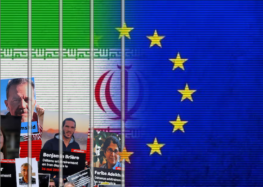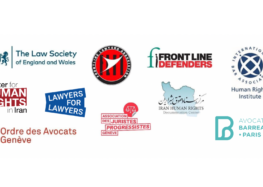One Week After Arrest, Detained Internet Technologists Appear Handcuffed on TV
Iranian state television has shown images of several men they claim have been in contact with and funded by “espionage networks,” charged with “offering reporter training seminars in Turkey and Malaysia,” “internet activities aiming for a ‘soft overthrow’ of the Iranian regime,” and “contact with foreign media, including the BBC.” In the images, the men, who are wearing prison uniforms, are all facing a wall with their hands handcuffed behind them.
A Judiciary official who appeared on television to make the announcement did not disclose the men’s identities. Narenji, a popular website specializing in computer and Internet technology, announced on December 3 that seven members of its editorial and technical team had been arrested by the Intelligence Unit of the IRGC in Kerman. The next day, Kerman’s Deputy Prosecutor announced the arrests of 16 website designers and Internet professionals in Kerman Province, stating the charges facing the group of individuals “who worked within a complex security-media network” were “committing cyber crimes and relations with foreigners.”
A source close to Narenji website who is knowledgeable about the details of the arrests told the International Campaign for Human Rights in Iran that he does not believe the Kerman IT professionals were involved in any criminal conduct. “The individuals who were arrested are all computer and Internet professionals and have not been engaged in any political activities. This, however, is a field where in order to pursue the latest developments and news, the professionals have to be in constant contact with the world outside. The Iranian Judiciary and Intelligence authorities, however, are sensitive to any type of contact with sources outside of Iran, even if these contacts are for professional reasons, and consider them ‘criminal,'” he told the Campaign.
“I believe the government’s cynicism about contact outside of Iran and the accusation of ‘cooperating with the BBC’ are only to intimidate all those in the online environment, especially those who follow the latest international developments and who need to be in touch with the outside world,” the source added.






